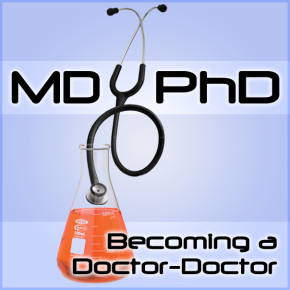 As an MD/PhD student, I’ve always understood that the training process would be neither easy nor brief. After five years as a biochemistry graduate student, I successfully defended my doctoral dissertation and earned a PhD in July. In August, I’ll be a full-time medical student, with three more years of medical school to go.
As an MD/PhD student, I’ve always understood that the training process would be neither easy nor brief. After five years as a biochemistry graduate student, I successfully defended my doctoral dissertation and earned a PhD in July. In August, I’ll be a full-time medical student, with three more years of medical school to go.
As I’ve wrapped up the graduate school era of my life, I’ve thought a fair deal about what I’ll miss, what I won’t miss, and what I’ve learned from the process.
What I’ll Miss
I will miss flexibility in my schedule. Although I spent the majority of time in graduate school adhering to a self-imposed daily work schedule, there was always the freedom to tweak my hours to accommodate experiments, off-campus appointments, and the occasional day when I needed a break.
I will miss having ample opportunities to explore scientific problems thoroughly through deep thinking and experimental assessment. While an inquisitive mindset is crucial to both a career in science and a career in medicine, the enormous amount of material that must be mastered in medical school likely won’t allow me much time to focus on any one problem in particular, in the way that I’ve had five years to explore some of the same problems in graduate school.
What I Won’t Miss
I won’t miss waiting for hours or days for mammalian cells or bacterial cells to reach the necessary confluence to start my experiments!
I won’t miss the meandering path. Pursuing a research degree can be quite risky. Choosing a productive research project or research laboratory can yield high-profile publications and a reasonable time-to-degree. Choosing a nonproductive research project can yield no or low-profile publications and a graduate school experience that lasts almost a decade. Unfortunately, it’s impossible to know whether the path being traveled will prove productive or nonproductive from the onset. Often it takes several years of hard work before realizing your lab environment is not a good fit, or your research project has fizzled out. Although my time-to-degree of just under five years is ahead of my departmental average (not to mention that I also spent four of those years completing first-year medical school coursework part time), I would estimate that only about 1% of my experiments were published, and only about 15% of my experiments were work directly leading to published work, usually experiment optimizations. The remainder of the work I did fell along nonproductive paths for various reasons.
What I’ve Learned from Five Years in Graduate School
I’ve learned that, while input does not always equal output, there are always lessons that can be learned from every experience. My long litany of failed graduate school experiments didn’t get me any publications, but they were steps along the path to figuring out how to better design and execute working experiments later. My research projects that fizzled out gave me clues about how to define better objective criteria to improve the chances of future research projects succeeding. Similarly, experience and learning from mistakes are invaluable tools in medicine both in learning how to master concepts effectively and diagnosing patients correctly.
I’ve learned that building strong relationships — with faculty, colleagues and support personnel — is critical. While I was a graduate student, I was fortunate to develop good relationships with several faculty members outside of my research lab, and these individuals provided me with invaluable advice, mentorship and support over the years. Similarly, developing good working relationships with my coworkers — fellow graduate students, postdocs and staff scientists — yielded strong collaborations and facilitated the sharing of knowledge. Much of the work I accomplished could not have been done without the expertise of support personnel, from the scientists at core facilities who helped me develop protocols and troubleshoot issues, to the administrative staff who helped me navigate departmental requirements.
Analogously, a medical student cannot succeed without cultivating strong relationships with senior faculty, attendings, residents, interns, fellow medical students, nurses, physician assistants, support staff and all other personnel in the healthcare facility.
My time in graduate school taught me a tremendous amount, and only a small fraction of this was the actual science. Though I started the path toward the PhD in hopes of becoming a skilled experimenter and master of a subfield of knowledge, I gained a lot of life experience, much of which is transferable to a career in medicine.
MD/PhD: Becoming a Doctor-Doctor
This column explores the MD/PhD career track from a current trainee’s perspective, including the benefits and challenges of pursuing two doctoral degrees simultaneously, time management and life balance, and post-graduation training and career opportunities.
